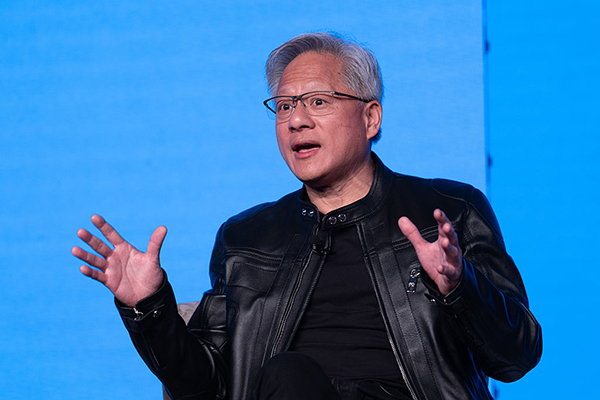ii view: demand for Nvidia next-gen AI chip is ‘extraordinary’
Battling China uncertainty but with another industrial revolution now arguably under way given changes AI is expected to bring. We assess prospects.
28th August 2025 11:21
by Keith Bowman from interactive investor

Second-quarter results to 27 July
- Revenue up 56% year-over-year to $46.7 billion (£34.5 billion)
- Adjusted earnings up 54% to $1.05 per share
- Cash dividend unchanged from the previous quarter at $0.01 per share
Guidance:
- Expects third-quarter sales of around $54 billion
Chief executive Jensen Huang, pictured above, said:
“Blackwell is the AI platform the world has been waiting for, delivering an exceptional generational leap — production of Blackwell Ultra is ramping at full speed, and demand is extraordinary. The AI race is on, and Blackwell is the platform at its centre.”
- Invest with ii: Buy US Stocks from UK | Most-traded US Stocks | Cashback Offers
ii round-up:
NVIDIA Corp (NASDAQ:NVDA) detailed sales and profit that beat Wall Street forecasts, although the computer chip maker remains cautious about future sales to China.
Second-quarter revenue rose 56% to $46.7 billion, including a 17% sequential rise in sales for its next generation Blackwell chip. That sent adjusted earnings up 54% to $1.05 per share. Analysts had expected outcomes of $46.1 billion and $1.01 per share respectively. Nvidia expects current third-quarter sales of around $54 billion, although the estimate excludes any potential sales to China.
Shares in the Nasdaq 100 company fell 3% in post results afterhours US trading having come into this latest news up by just over a third so far in 2025. The Nasdaq 100 is up 12% over that time. Datacentre provider and user of Nvidia chips Microsoft Corp (NASDAQ:MSFT) is up a fifth year-to-date.
As well as hosting powerful AI related software in datacentres, Nvidia chips are also used in other areas such as gaming consoles and potentially to drive autonomous, or self-driving cars.
Nvidia sold no chips to China during this latest quarter under a US government ban, forfeiting an estimated $8 billion in sales. Nvidia recently signalled its expectation for the ban on the estimated $50 billion Chinese market to be lifted.
Datacentre related sales for this latest quarter climbed 56% from a year ago to $41.1 billion. Gaming sales rose 49% to $4.3 billion with automotive and robotic focused sales up 69% to $586 million.
A dividend of $0.01 per share is unchanged from the previous quarter, with $9.7 billion of its own shares purchased during the quarter and management approving an additional $60 billion to the programme.
Broker Morgan Stanley reiterated its ‘overweight’ stance on Nvidia shares post the results, increasing price target to $210 from $206 per share.
Third-quarter results are likely to be announced late November.
ii view:
A constituent of the Nasdaq 100 and Dow Jones index, Nvidia credits its invention of the Graphics Processor Unit (GPU) in 1999 for fuelling the boom in the PC gaming market. Today, the company describes itself as the world leader in accelerated computing, given wide use of its computer chips and its own supporting Cuda software in datacentres globally.
For investors, US government concerns about China’s rising economic and military power are likely to leave exports to the nation closely watched. Competition from China-made high performance chips and companies such as Huawei is not to be overlooked. Power consumption concerns for the wider datacentre industry sit against climate change threats, while the worries of many governments regarding the potential power of AI and its impact on human society require deep thought.
- Watch our video: Polar Capital Technology: best and worst AI stocks
- Nvidia is among these four stocks I still rate a buy
- Sign up to our free newsletter for investment ideas, latest news and award-winning analysis
More favourably, demand for its datacentre related high performance chips continues to boom, now supported by its next generation Blackwell chips. An estimated PEG or price/earnings-to-growth ratio of 0.6 times compares to an average of nearer 3 times for other Magnificent Seven stocks, suggesting potential value. The prospects for AI innovation including self-driving vehicles and potentially ground breaking medicines cannot be ignored, while founder Jensen Huang, with all his many years of experience, continues to lead Nvidia.
On balance, valuing Nvidia, given its status as the eminent play by investors on the future of AI, remains extremely difficult and leaves the shares highly volatile day-to-day. That said, sales momentum persists, with investors likely to remain long-term optimistic on this innovative US tech titan.
Positives:
- Exposure to growth in data centres and AI
- Selling new generation Blackwell product
Negatives:
- Uncertain economic outlook
- US and China tensions
The average rating of stock market analysts:
Strong buy
These articles are provided for information purposes only. Occasionally, an opinion about whether to buy or sell a specific investment may be provided by third parties. The content is not intended to be a personal recommendation to buy or sell any financial instrument or product, or to adopt any investment strategy as it is not provided based on an assessment of your investing knowledge and experience, your financial situation or your investment objectives. The value of your investments, and the income derived from them, may go down as well as up. You may not get back all the money that you invest. The investments referred to in this article may not be suitable for all investors, and if in doubt, an investor should seek advice from a qualified investment adviser.
Full performance can be found on the company or index summary page on the interactive investor website. Simply click on the company's or index name highlighted in the article.